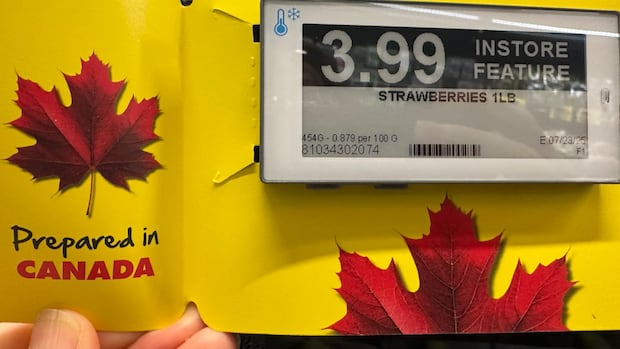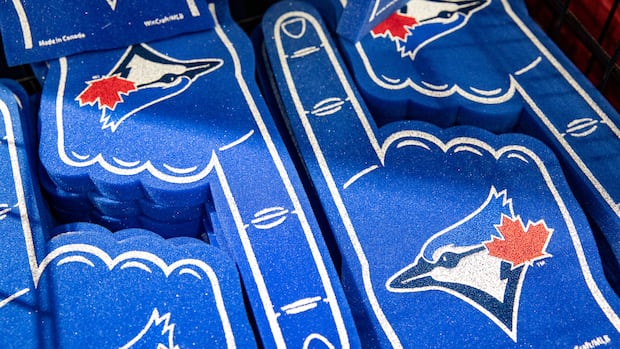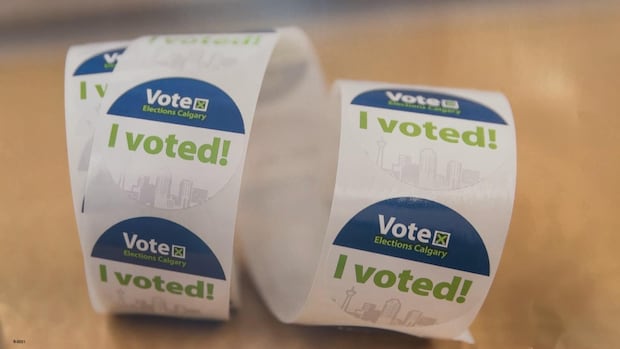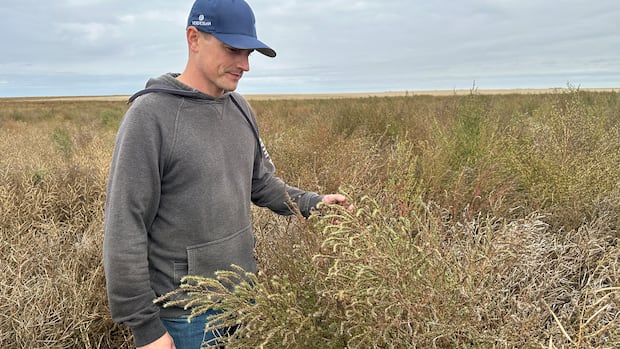Like many shoppers these days, Stacey Dineen, who lives just outside Kitchener, Ont., is all-in on the buy Canadian movement.
“Trump’s comments about annexing Canada, wanting to make us part of the United States, boy, that really kind of lit something,” she said.
Dineen buys Canadian food whenever she can, but when she can’t, she looks for imported products from outside the United States.
And Canada’s major grocery chains have jumped on the trend, running patriotic ads and pledging to help shoppers buy Canadian.
But Dineen says she gets frustrated when grocers provide conflicting information about where a product comes from.
Last week, for example, she saw organic broccoli at her local Sobeys grocery store. A sign stated it was a “product of Canada,” but the fine print on the tag said “produce of USA.”
“It makes me feel misled,” said Dineen. “At this point, I have run out of patience for it. It feels — at the very least, it’s careless.”
New data from the Canadian Food Inspection Agency (CFIA) and a CBC News investigation suggests country-of-origin mislabeling by grocers is an ongoing problem. It’s also against the rules; in-store food signage must be accurate and not misleading.
The CFIA, Canada’s food regulator, told CBC News that between November 2024 and mid-July, it received 97 complaints related to country-of-origin claims.
A CBC News investigation discovered some Canadian grocers were found to be overcharging customers, potentially by including the weight of the packaging in the cost of meat, which over time could add up to millions in profit. One of the grocers has apologized and all have pledged to address the issue.
Of the 91 complaints investigated so far, the CFIA found companies violated the rules in 29 (32 per cent) of the cases. Most involved bulk produce sold in stores, and in each case the problem was fixed, according to the agency.
CBC News visited grocery stores operated by Sobeys, Loblaws and Metro in downtown Toronto this month and found similar issues among both bulk and prepackaged produce. At each store, one or more country-of-origin shelf signs in the produce section stated the accompanying product was a “product of Canada” or Mexico, but the product’s sticker or packaging said it was a “product of USA.”
And it’s not just produce. CBC News also found questionable Canadian signage for more than a dozen other types of products at the Sobeys store, including imported raw almonds promoted with a red maple leaf symbol and a “Made in Canada,” declaration.

“We don’t grow almonds in this country. Those should not meet the Made in Canada threshold,” said Mike von Massow, a professor in the Department of Food, Agricultural and Resource Economics at the University of Guelph.
He added that a high turnover of grocery products can sometimes lead to mistakes.
However, food labelling expert Mary L’Abbé says that, six months into the Buy Canadian movement, shoppers’ patience for grocer errors is wearing thin.
“It’s important to Canadians, and I think they have a responsibility to their consumers who expect them to interpret the regulations correctly,” said L’Abbé, a nutritional sciences professor emeritus at the University of Toronto.
“I think the retailers have to step up to the plate and actually get their act together.”

Grocers respond
Back in the produce section at Sobeys, CBC News found a large sign promoting blueberries as a “product of Canada.” But the fine print on the packaging said the berries were a “product of USA.”
“That’s false advertising,” said von Massow, suggesting human error as a possible cause.
At the Loblaws store, CBC discovered several produce items, such as berries, squash and eggplant where shelf labels indicated they were a “product of Mexico,” while product stickers or packaging revealed they were a “product of U.S.A.”
Packaged raspberries and blackberries at Metro had similar inconsistent labelling.

At a Loblaw-owned No Frills in Toronto, CBC found different inconsistent labelling. The store displayed strawberries with signage that included a red maple leaf and the phrase, “Prepared in Canada.” But the berries’ packaging stated that they were a “product of USA.”
It’s possible that the strawberries were packaged in Canada, but the CFIA told CBC News it would be inappropriate to use a “Made in Canada” or “Prepared in Canada” claim if a product was only packaged here.
L’Abbé says the No Frills ad is misleading.
She points out that big grocers have launched big marketing campaigns centred around the Buy Canadian movement. Both Loblaw and Sobeys have produced slick, patriotic ads prominently featuring the Canadian flag.
“Obviously they’re spending money on those marketing campaigns,” said L’Abbé. “They can also do the work behind the scenes to make sure that they’re advertising things correctly.”
CBC News sent photos of its findings to Loblaw Companies Limited, Sobeys Inc., and Metro Inc.
Loblaw did not directly answer questions about the strawberries, but shortly after CBC’s inquiry, the maple leaf and “Prepared in Canada” signage on the strawberries was gone.

Loblaw, Sobeys and Metro each told CBC News in separate emails that they strive for accurate country-of-origin signage, but noted that the task is challenging when dealing with mass inventory.
“Fresh produce can change week-to-week and unfortunately mistakes can happen from time to time,” said Sobey’s spokesperson, Emily Truesdale.
Loblaw and Metro offered an apology to customers for any mishaps and encouraged them to alert the store if they discover inconsistencies.
Both grocers also said they’re working with store staff to reinforce signage policies and minimize errors.
“As a result of [CBC’s] inquiry, stores received reminders about checking produce labels,” said Metro spokesperson Stephanie Bonk.

Imported but made in Canada?
In response to the Buy Canadian movement, big grocers began marking many domestic products in stores with a maple leaf symbol. But sometimes it winds up on products with no apparent Canadian connection.
“There are lots of opportunities for things to get confusing,” said von Massow. “It’s important for these stores to be transparent.”
At the Sobeys store, CBC News found more than a dozen “imported” house-brand Compliments products, including ice cream cones, salad dressing, raw nuts and graham crackers, displayed with a red maple leaf symbol.
Sobeys’ website says the maple leaf symbol refers to items that are “Made in Canada” or are a “Product of Canada.”
According to the CFIA, “Product of Canada” refers to food that is entirely or almost entirely created in the country. To qualify as “Made in Canada,” the last significant transformation of a food product must occur in the country.
But the packaging for each of the imported house-brand items states that it was “imported for Sobeys” with no qualifying statement about a Canadian connection.

“Why would you put a Maple Leaf on a product that very clearly is imported?” asked Dineen, who discovered imported raw almonds and “California natural” walnut pieces marked with a maple leaf at her local Sobeys.
“It just erodes the trust. It just makes you think, ‘OK, so that’s meaningless.'”
Sobeys did not directly answer questions about imported Compliments products marked with a maple leaf.
Von Massow says if you’re unsure about any store or product labels, ask store staff for an explanation, or call the product’s customer service line, often printed on the packaging.
As anger over U.S. President Donald Trump’s trade war fuels a surging ‘Buy Canadian’ movement, The National asks marketing professor Grant Packard to help navigate supply-line confusion so Canadians can keep their elbows up at the checkout line.









